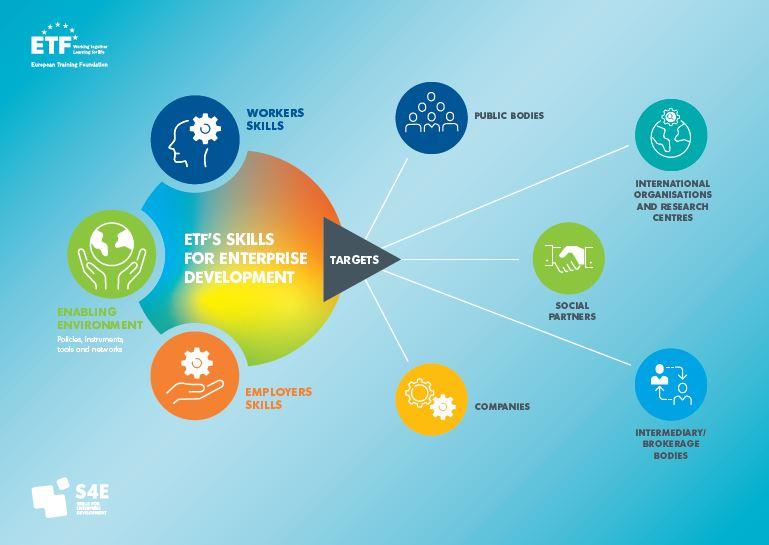
Acting on Skills: recovery pathway
Webinar, 10 -11 December 2020
Beyond the pandemic crisis, two trends are fuelling changes in the labour market: the green transition and the technological transition, said Anastasia Fetsi, ETF’s Head of Operations, in the opening address at a recent event exploring the importance of skills for the post COVID-19 recovery.
These trends will affect business models and production processes, “and hopefully create new jobs,” continued Festi. In the short-term, as the global economy emerges from the COVID crisis, “no skills” will equal “no recovery.” Key elements will be the labour market, youth and enterprise development, and greater inclusion of underrepresented groups in the workforce.
Over 300 policy-makers, experts and researchers from the ETF Partner Countries, EU Member States and regional and international organisations attended the virtual event organized by the European Training Foundation (ETF) in collaboration with the European Bank for Reconstruction and Development (EBRD), the International Labour Organization (ILO), the United Nations Children's Fund (UNICEF) and United Nations Industrial Development Organisation (UNIDO).
At EU level adaption and delivery are key issues for Active Labour Market Policies (ALMPs) with some countries using counselling measures to enable quicker job uptake. Examples were given of innovative ALMPs in response to COVID-19 challenges in the EU Neighbourhood and Central Asia countries. Raisa Dogaru, Director, Employment Agency of the Republic of Moldova, outlined how her country adapted to the COVID crisis by providing support to employers, boosting worker and unemployed protections and monitoring labour market trends.
In the second session on skills and labour market transition focus was given to ways to respond to the needs of young people, and how to build resilience, skills and employment. Afshan Khan, Director, UNICEF Europe and Central Asia Regional Office, drew attention to the specific challenges of young people as students in this COVID era. Moreover, the ETF Director, Cesare Onestini, noted how young people are at the fringe of social dialogue and have little representation at policy level which can reinforce existing vulnerabilities.
‘ETF together with UNICEF and other partners are working to make sure their voices are heard by policy makers’, said Onestini.
Within this context the findings of the UNICEF-ETF study ‘Preventing a ‘Lockdown Generation’ in Europe and Central Asia: Building Resilient Societies with Young People in the Era of COVID-19’ were presented.
The session concluded by focussing on EU Neighbourhood regional cooperation and its potential to boost ETF Partner Countries’ efforts for managing the socioeconomic effects of the crisis and avoid a long-lasting impact on younger generations. Jeroen Willems, Deputy Head of Unit in the Directorate-General for Neighbourhood and Enlargement Negotiations (DG NEAR), European Commission, introduced the goals of the New Deal for Youth in the Eastern Partnership region and expected benefits for youth employability.
To set the context of the second day of the event about managing the impact of the health crisis and the digital and green transitions, the results of a global survey undertaken by ETF and UNIDO in 2020 on the impact of COVID on industrial firms were presented. Some 42% of those surveyed expect to need different kinds of skills in the future, particularly ICT and soft skills, and the results demonstrated that the pandemic is accelerating already existing trends.
Biljana Radonjic Ker-Lindsay, Associate Director, Access to Skills and Employment - Gender and Economic Inclusion, EBRD, in her presentation highlighted the disproportionate effect on women of the COVID crisis and lockdowns, partly because they tend to take greater responsibility for taking care of children and the elderly. Women are also at higher risk of replacement by digitalisation and automation. “Skills development programmes need to concentrate on gender equality measures,” Radonjic Ker-Lindsay concluded.
Turning to the development of green skills, Riccardo Savigliano, Chief of Agro-industries and Skills Development, UNIDO, urged attention to ensure education and training are seen as investments and not costs, which is sometimes difficult for cash-strapped SMEs. The green approach should also adopt the old adage, “think globally but act locally.” Savigliano highlighted how once again the COVID crisis has accelerated already existing trends.
Xavier Matheu de Cortada, head of Policy Unit, ETF, concluded the session and event by announcing the ETF’s new programme 'Skills for Enterprise Development' which will be launched in 2021 to support enterprises in ETF’s partner countries with skilling and reskilling.
Did you like this article? If you would like to be notified when new content like this is published, subscribe to receive our email alerts.